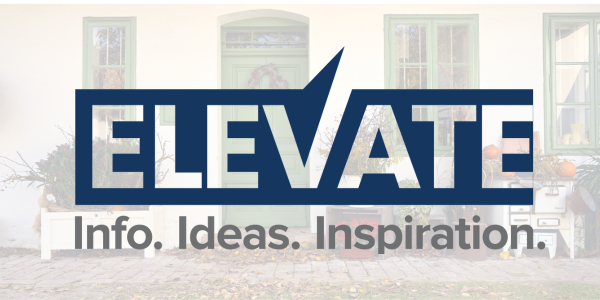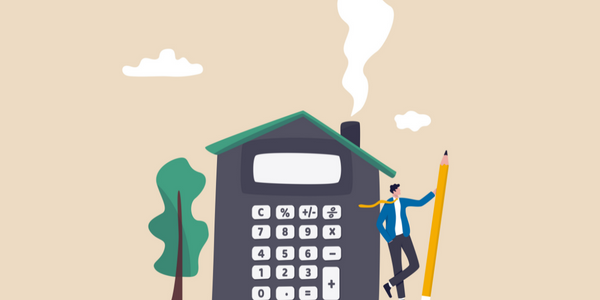
REACH YOUR GOALS
Using Your Equity to Pay Off High Interest Debt
High interest credit card debt can suck the life out of anyone. Paying off your credit card debt at today's high interest rates can also take major sacrifice—but it doesn't have to. Not if you're a homeowner, anyway.

You could pull your purse strings tighter than you've ever imagined, living off of ramen and ad-riddled movies and TV shows. Or you could leverage the reward of built-up home equity to achieve something useful.
Using a Home Equity Loan to Pay Off Credit Card Debt
Your home equity can become a beacon when you're staring down the dark hole of credit card debt with high interest rates.
Through a cash-out refinance, home equity line of credit (HELOC), or home equity loan (HELOAN) you can pay off your debt or consolidate multiple credit card accounts with high interest rates into one manageable payment. This payment is typically lower than the combined monthly payments you had been making to all your creditors.
How It Works
A cash-out refinance will replace your existing mortgage with a new, larger mortgage. You'll receive the difference between the new loan balance and your old loan balance in cash. You can then use this money to pay off high interest credit card debt.
To start the process, a mortgage lender will evaluate your refinance application and order an appraisal to determine how much your home is worth. The cash disbursement will be used to first pay off what you owe on your mortgage. And then the remainder will go to you to tackle that credit card debt.
Your second option, a HELOC, lets you take out a line of credit against your home. Though terms may vary, you generally have a 10-year draw period in which you can withdraw money up to the maximum credit line. You then have 20 years to pay back the principal and interest on whatever you withdrew. During the draw period, you're required to pay interest only on the money you withdraw.
Another option is a home equity loan (HELOAN), also known as a second mortgage. This is a fixed-rate mortgage that is typically 15 years in loan term. Instead of the revolving credit line a HELOC offers, it's a fixed home loan. You'll get a check at closing for a specific amount, the rate and payments are fixed, and you can use the funds to consolidate your debt.
Whether you opt for immediate cash in hand with a cash-out refinance or use a HELOC or HELOAN to pay off or consolidate high interest credit card debt, you'll want to understand that you'll have a new mortgage loan—or, in the case of a second mortgage—a new interest rate.
Considerations with a Debt Consolidation Refinance
Refinancing your mortgage to tap into your home equity isn't all roses, though. That's why you need to make sure it's the right move for you and your financial future. Refinancing your mortgage to tap into your home equity isn't all roses, though. That's why you must ensure it's the right move for you and your financial future.
1. Higher monthly mortgage payments
Your monthly mortgage payments will increase since you're taking on new terms and a new mortgage balance. However, if you're consolidating your debt into a lower interest rate with a single payment, the overall savings can outweigh the cost.
2. More mortgage interest
A debt consolidation refinance can save you tons of money on high interest credit card debt. But you will end up paying more in interest on your mortgage over the life of the new loan.
3. Loss of deductibility
Unlike mortgage interest, interest tied to other outstanding debts, such as high interest credit card debt, is not tax-deductible.
4. Long-term commitment
A cash-out refinance or home equity line of credit will commit you to a new loan and repayment structure for the next 20 to 30 years.
5. Closing costs
Tapping into home equity comes with closing costs. These costs typically range from 2% to 6% of the loan amount, plus you will incur third-party fees like a home appraisal and title and escrow fees.
Thinking of Using the Equity in Your Home?
Using home equity to pay off high interest credit card debt can be a great move for homeowners who can swing their new monthly payments and plan to stay in their home for a while. Not only can you pay off that credit card debt faster, but you can bump up your credit score and save big on credit card interest that would have been eating into your financial dreams.
It's true that these options may come with higher monthly mortgage payments and additional closing costs. But the long-term benefits may make one of them a viable solution if your high interest credit card debt is out of control and ruining your life.
Want to see what this means for you? Let's connect and we'll go over the numbers and find out what is best for your specific financial situation and goals.
MORTGAGE IQ
To HOA or Not to HOA: A Homebuyer's Guide
If you're currently browsing properties for sale online, you may have noticed a growing number of subdivisions with a Homeowners Association (HOA). While an HOA can provide residents with popular amenities, their membership fees add to your monthly costs.
HOAs govern the homes, condos or townhomes within a subdivision or building. They typically provide services and amenities such as maintenance, landscaping, gym facilities, playgrounds, and/or pools. Homeowners pay HOA fees to cover the costs of maintenance and repair.
Here are some of the pros and cons you'll face when making the decision about life with an HOA.
Pros:
- Residents of a neighborhood governed by an HOA won't have to worry about a neighbor who never mows their lawn, or whose dogs bark nonstop. This helps protect your property values.
- If you enjoy working out, swimming, or throwing big parties, an HOA may provide you with a pool, gym or clubhouse, enriching your leisure hours.
Cons:
- Membership in an HOA is mandatory, so you can't "opt out" if it doesn't interest you.
- Your HOA fees may increase, especially if major repairs are needed for amenities or shared systems, such as sewers.
- You may not agree with some HOA rules, and some may seem petty or draconian.
If you consider buying a home with an HOA, you'll want to learn as much about it as possible. In addition to reviewing current rules and regulations, you'll want to find out its financial standing. Reviewing notes from recent HOA meetings is also helpful.
Source: howtomoney.com
FINANCIAL NEWS
Financial Advisors Offer Election Predictions
No matter what your views, many of us are wondering about the results of the upcoming presidential election scheduled for November 5th. While there are plenty of so-called experts offering predictions on social media, a major financial advisory firm—LPL Financial Holdings—has their own ideas, based on stock market performance.
The folks at LPL are saying that the performance of the S&P 500 has accurately predicted the winner of the U.S. presidential election 83% of the time.
Here are the stats that form the foundation of this prediction.
- Since 1928, the incumbent party remained in control of the White House in 12 out of the 15 elections when the S&P 500 was positive during the three months leading up to an election.
- The incumbent party lost the election eight out of the last nine times when S&P market returns fell in the three months before an election.
However, in any given year, market conditions, investor sentiment and economic factors can vary widely. Therefore, historical performance is not the best indicator of how the S&P 500 will perform on a year-by-year or month-by-month basis.
There's no truly reliable way to guess the outcome of an election, and polls have proven to be unreliable. Therefore, basing outcomes on the stock market's short-term performance is hardly a perfect science.
Source: money.com
DID YOU KNOW?
White House Plans to End Subscription Cancellation Nightmares
If you've ever spent hours on the phone trying to cancel a magazine subscription or have been forced to write a letter to cancel a gym membership, an end may be in sight.
Recently, the White House announced a new group of actions called Time is Money, which is a group of strategies for getting rid of things that waste consumers' time and money. These include unhelpful chatbots, "doom loop" phone menus that never connect callers to solutions, and difficult subscription cancellation practices.
"This work came from scores of conversations with people—consumer advocates and others—about practices that are really designed to get people crazy and, honestly, they're really designed for you to give up." says Neera Tanden, director of the Domestic Policy Council of the United States.
Another Time is Money incentive is designed to cure consumer headaches when airlines cancel flights. Airlines will be required to refund your airfare when rebooking doesn't work for you.
Source: nerdwallet.com
PERSONAL FINANCE
How the SECURE 2.0 Act Changed 401(k) Withdrawal Options
The Setting Every Community Up for Retirement Enhancement (SECURE) 2.0 Act is a federal law passed to help Americans save for retirement. One section introduced the use of tax-deferred retirement accounts as emergency funds.
Previously, savers with an "immediate and heavy" financial need could make an early withdrawal from their 401(k) but it would be subject to income tax. Those under age 59½ (the standard age for penalty-free withdrawals) typically owed a 10% tax penalty.
Other savings accounts that qualify include 403(b), 457(b), and some Individual Retirement Accounts (IRAs), including SEP and Simple IRA.
Now savers can make one withdrawal of $1,000 per year to cover personal and family emergency expenses without the 10% penalty. (Victims of domestic abuse under the age of 59½ can withdraw up to $10,000 from IRAs and 401(k)s without owing the penalty.)
The funds are still subject to income tax unless repaid within three years, and the account must have a minimum $1,000 balance after the withdrawal.
If you're dealing with more than your share of financial emergencies, this ruling could make a big difference. However, your 401(k) should remain focused on its primary purpose, which is to secure your future retirement plans.
Source: lifehacker.com
FOOD
Homemade Pumpkin Spice Latte
If you'd like to try out a dairy-free version of this drink, or cutting down on your trips to the coffee drive-through, you can make your own Homemade Pumpkin Spice Latte in just minutes at home.
REAL ESTATE TRENDS
Rumors is Behr's Color of the Year
Predicting the most popular interior design directions for next year is never easy, and most decorators are claiming there's no real trend yet. Behr's Color of the Year 2025 pick continues the non-trend.
Behr's Rumors is a striking dark red that both conveys a sense of nostalgia and fits neatly into some of today's top decor looks, including soft luxury and the buzzy "unexpected red" theory.
The unexpected red theory was introduced earlier this year by TikTok creator Taylor Simon of @intayriors. It caught on big-time, with over 800,000 views. According to Taylor, one can add a pop of unexpected red to any room where it doesn't match. Even a single piece of furniture, a hallway, or a bathroom basin can rock Behr Rumors red.
According to those who study how color affects us, red tends to encourage strong emotions and stimulate energy with those around it. It's even been proven to stimulate appetites, so adding the Rumors color to a formal dining room could be something to consider.
Source: behr.com








